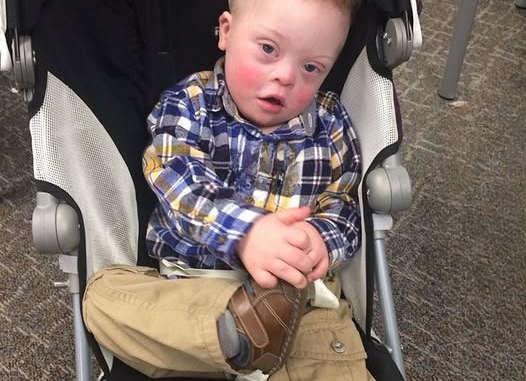
My Son Was Silent for Years—Until His Sister Sang a Song That Changed Everything
We spent years waiting for Luca to speak.
Born with Down syndrome, Luca has always been the light of our home. But words? They never came easy. We tried it all—speech therapy, sign language, flashcards, puppets. Nothing seemed to click. By the time he turned three, silence had become our norm. He’d giggle, hum, clap—sounds that filled our hearts, yes—but not a single word.
Through it all, his big sister Maris—six going on sixteen—never stopped trying. She’d chat away to him like he was any other classmate, pulling him into her stories, reading him bedtime books, dragging him through her pretend worlds. Lately, she’s been obsessed with a certain Disney tune: “You’ve Got a Friend in Me.” She sings it constantly like it’s her theme song.
Then came last Tuesday.
After dinner, she plopped down on the couch next to Luca, started belting out her favorite song, as usual. I was half-tuned in, drying dishes in the kitchen, when I heard something that stopped me cold.
A voice. But not hers.
I froze.
She paused.
Then I heard it again.
“Fren.”
I dropped the dish towel.
Maris’s eyes went wide. “Mom… he said friend.”
And there was Luca, grinning, clapping like he’d just pulled off a magic trick. He leaned into her, proud as ever.
I didn’t grab my phone. I didn’t think to record. I just stood there, crying with soapy hands, overwhelmed by this long-awaited moment.
We’ve been trying to get him to say it again ever since. And yesterday, something beautiful happened during our weekend FaceTime with my mom—Nana Bea.
Nana Bea is a few states away but ever present—our cheerleader through every therapy, every milestone. During the call, Maris grabbed her toy microphone and launched into her usual performance. Luca sat beside her, hands flapping in excitement. My mom watched through the screen, her eyes twinkling.
Maris paused mid-song and said, “Mom, turn off the music. I can sing better without it.” My husband, Erik, paused the karaoke track, and she cleared her throat like a diva on stage.
“You’ve got a friend in me,” she sang.
Then it happened again.
“Fren,” Luca whispered. Then, “Mee.”
He couldn’t get it out perfectly—but the effort, the intention—it was everything. I screamed. The phone tumbled off the stand. My mom shouted, “I heard that!” through the speaker. Maris hugged him tight. Luca just laughed and clapped, as if he’d just saved the world.
Later that night, Maris tiptoed into my room with a mix of excitement and worry. “Mom,” she asked, “do you think Luca will talk more tomorrow?”
My heart broke and swelled all at once. “Sweetheart,” I said, “whether it’s tomorrow or next month, every sound he makes is worth celebrating. And he will get there.”
She smiled, kissed my cheek, and said, “Then I’ll just keep singing until he does.”
The next day was chaos—Luca hadn’t slept well, the neighbor’s dog barked half the night, Erik was buried in work calls, and Maris spilled chocolate milk on her favorite shirt. No one was exactly in the mood for a musical.
But mid-morning, Luca started whining, frustrated and pointing at the hallway closet. I asked if he wanted something. He let out a groan, pointed again, then—clear as anything—said, “Gah.”
It may sound like nothing. But for us, it was new. It was intentional.
I pulled out one of his favorite books. He lit up. Maris came running. As if on cue, she sang again.
“You’ve got a friend in me…”
Luca clapped, then made the sound again. “Freh…nn…mee.”
It wasn’t perfect. But it was enough to make my heart burst. Erik peeked in from the kitchen, still on a call, and mouthed, “Is he talking?” I nodded, eyes full of tears.
Then came something unexpected. The next day, during Luca’s speech therapy session with Donna—who’s worked with him since he was a baby—Maris started singing again. Donna encouraged her, smiling, and as Maris belted out her song, Luca joined in softly.
“F-fren…Mee.”
Donna looked stunned. “That’s amazing, Luca!” she said. “Music is incredible for language development. Keep singing with him. Keep pairing words with songs. This is a breakthrough.”
That night, we had a mini celebration—box mix brownies, a milkshake for Maris, and lots of cheering. Maris asked Luca to sing again. He just clapped and said, “Fren,” and we all lost it.
As I tucked them into bed, Maris whispered, “Mom, I think Luca’s talking because he knows I love him.”
And you know what? I think she’s right.
Over the next few weeks, Luca’s been exploring new sounds. He’s not forming sentences, but he’s trying—shaping words, experimenting with his mouth, clapping when he hears applause. We still use signs and gestures, and we celebrate every single one. But when Maris hits play on her Disney playlist, his face lights up. He claps along, bounces, and tries to sing.
And I’ve realized something.
Progress doesn’t always show up in therapy reports or structured routines. Sometimes, it sneaks in during a spontaneous living room concert. Sometimes, it’s born from love, not strategy.
To anyone walking a similar path—waiting for words, praying for progress—please don’t lose hope. Keep singing. Keep showing up. Keep believing. Because one day, one word will break through the silence—and that word will carry more weight than you ever imagined.
For us, it was “friend.”
And it meant everything.